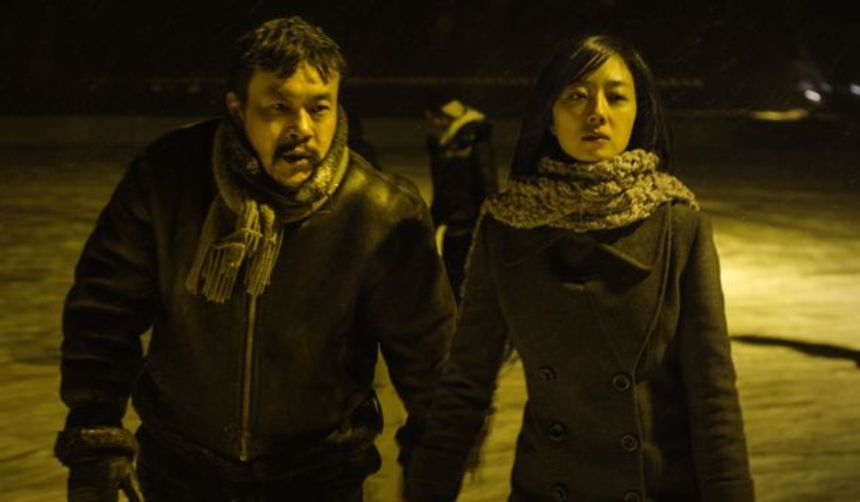Udine 2014 Review: BLACK COAL, THIN ICE Is A Cold, Compelling Crime Drama

This year's surprise Golden Bear winner at Berlin is a bleak, yet engrossing whodunnit set in the wintry climes of Northern China.
For his third feature film, writer-director Diao Yinan (Uniform, Night Train) evokes both Hollywood procedurals and European arthouse cinema for his story of a disgraced and traumatised ex-cop who continues his search for a serial killer in China's industrialised North. Black Coal, Thin Ice is also the latest in a series of high profile yet independently spirited Chinese films to embrace crime genre sensibilities, while addressing socio-economic issues in contemporary China.
When a dismembered corpse is discovered scattered across a number of different coal depots in Heilongjiang province, Detective Zhang Zili's (Liao Fan) investigation leads him to a pair of coal workers. Attempting an arrest, both suspects and two cops are killed, while Zhang is left deeply traumatised and discharged from the force. Five years later, Zhang is now a full-blown alcoholic working as a factory security guard. When two new victims emerge, disposed of in similar fashion and both known lovers of the original victim's widow, Zhizhen (Gwei Lun Mei), Zhang and his former partner, Wang (Yu Ailei) resume their investigation.
Black Coal, Thin Ice is staged against an incredibly hostile backdrop, where perpetual snowfall reduces visibility to a minimum, the hard, icy ground makes any motion all the more tentative, and the black, dirty coal depots immediately evoke a backward-thinking community hindered by antiquated technology, that dirties everyone's hands just by association. It soon becomes apparent that Zhang's investigation is more about indulging his own haunted past and lingering obsession than a genuine desire to bring a killer to justice. The case has had an incredible effect on him, both physically and emotionally, costing him everything from his career to his family and slowly but surely, his sanity. Perpetually drunk to the point his entire worldview is seen through a blizzard of booze, Zhang locks focus on the pretty young Zhizhen. Perhaps she can help with the case, but more likely Zhang just wants her to save him.
Diao's style is deliberate and measured, yet never feels sluggish or lethargic. He displays an intriguing blend of genres and filmmaking styles, letting the investigative elements of the story unfold in the manner of a Hollywood thriller, while pacing his drama more like a European film, never afraid to let his camera linger on his characters as they slowly reveal themselves over time. All the while, the contemporary Chinese setting depicts a country caught in a massive economic upheaval. From the factories and laundrettes, to nightclubs and housing estates, Diao lets us explore a community where industry, commerce and wealth are crashing together, creating new class divides and widening gaps in wealth, education and affluence.
Zhizhen is understandably traumatised by recent events, but there is a definite suggestion that somehow she holds the key to the case. Under the protective wing of her boss/would-be lover, she lives a simple, solitary life, one which Zhang seems intent on disrupting, for both personal and professional gain. Yet the closer Zhang gets to her, the more danger he is putting himself in from whomever it is lurking out there in the shadows.
Liao Fan took home the Silver Bear award for Best Actor, for an incredibly controlled yet layered performance as the deeply troubled and irrevocably broken Zhang. A man with jaded ideals, clouded morals and wavering judgement, Zhang is a fascinating central character for a detective story, flawed, tragic, possibly even incompetent, yet somehow able to win the sympathy of the audience.
Liao is matched applaudably by Taiwanese actress Gwei Lun Mei as the icy cold widow Zhizhen. She seems almost completely impenetrable for long periods of the film, yet slowly but surely Zhang is able to thaw her just enough to get himself deeper into trouble with every aspect of the case. Zhizhen's beauty, silence and reluctance to communicate on any level makes her a compelling counterpoint to Zhang's dishevelled, broken antihero.
Needless to say, Black Coal, Thin Ice has bursts of violence and brutality throughout, not to mention one of the most memorable murder weapons in recent memory. There's also a suspenseful cat and mouse element to the film that keeps its audience committed and engaged during its more languid sequences. There is an almost otherworldly mood to the film, perhaps suggested by the far more poetic Chinese title, "Fireworks in Daylight". Referenced overtly more than once in the narrative, it suggests a futility to Zhang's endeavours, a wastefulness of his resources, or perhaps that appearances only reveal themselves once the black of night is upon us.
Either way, Diao Yinan's film is the latest, and one of the best examples of a growing wave of low budget contemporary crime dramas to emerge from mainland China, taking its place comfortably alongside Jia Zhangke's A Touch of Sin and Ning Hao's No Man's Land. While less overtly critical of "the system" than either of its counterparts, Black Coal, Thin Ice is perhaps the most accessible, acutely aware of how Chinese cinema can find an appreciative and wide-reaching international audience.
Black Coal, Thin Ice
Director(s)
- Yi'nan Diao
Writer(s)
- Yi'nan Diao
Cast
- Fan Liao
- Lun Mei Gwei
- Xuebing Wang
- Jingchun Wang

Do you feel this content is inappropriate or infringes upon your rights? Click here to report it, or see our DMCA policy.






